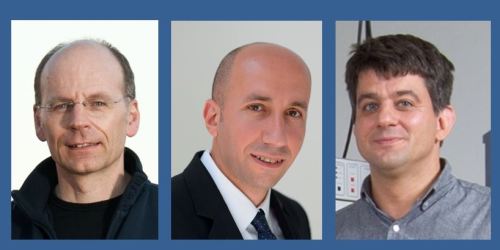Monash University awards three HZB-scientist with adjunct professorships

Prof. Klaus Lips, Prof. Emad Aziz and Dr. Alexander Schnegg (f.l.t.r) have been awarded with adjunct professorships by Monash-University. © HZB
Cooperation between Helmholtz-Zentrum Berlin (HZB) and Monash University, Melbourne, Australia, is thriving. Now, Monash University has awarded three HZB-scientists with adjunct professorships: Prof. Klaus Lips, Dr. Alexander Schnegg and Prof. Emad Aziz have been working several years already with Prof. Leone Spiccia, an internationally renowned chemist at Monash University, on energy materials science.
Spiccia is investigating artificial photosynthesis in order to develop solutions to convert solar energy into easily storable hydrogen. In 2011 and 2014 he spend time as a guest scientist at HZB working with teams of Lips, Schnegg and Aziz. Numerous publications in high impact journals have been the result of this fruitful collaboration.
As adjunct professors the HZB-scientists are entitled to organise workshops and seminars at Monash University and to further common research projects. To do so, they are given access to the resources of ARC Centre of Excellence for Electromaterials Science at Monash University.
.
arö
https://www.helmholtz-berlin.de/pubbin/news_seite?nid=14480;sprache=en
- Copy link
-
Rutger Schlatmann re-elected as ETIP PV Chair
The ETIP PV Steering Committee elected a new Chair, as well as two Vice-Chairs for the term 2024 – 2026. Rutger Schlatmann, head of the division Solar Energy at the HZB, and professor at HTW Berlin, was re-elected as the ETIP PV Chair.
-
Perovskite solar cells: TEAM PV develops protocols to ensure reproducibility
Ten teams at Helmholtz-Zentrum Berlin are building a long-term international alliance to converge practices and develop reproducibility in perovskite materials. The TEAM PV project is funded by the Federal Ministry of Education and Research (BMBF), Germany.
-
Photovoltaic living lab reaches the 100 Megawatt-hour mark
About three years ago, the living laboratory at HZB went into operation. Since then, the photovoltaic facade has been generating electricity from sunlight. On September 27, 2024, it reached the milestone of 100 megawatt-hours.
